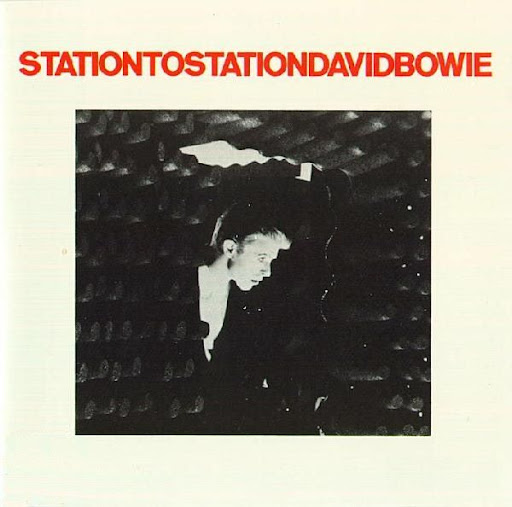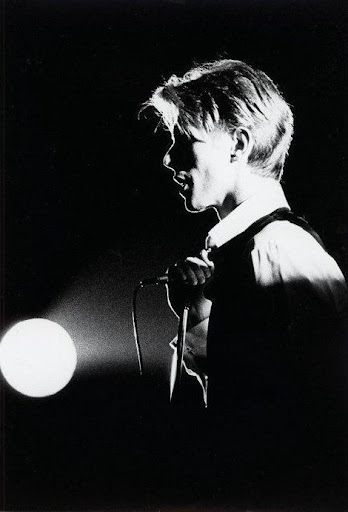
Station to Station needs to be looked at with some historical perspective. It had been over three years since Aladdin Sane, and Bowie's drug use was literally killing him (I'll post the BBC doc Cracked Actor in the near future to show how bad it was), and to top it off, what little life in him was completely spent in the making of The Man Who Fell to Earth.
But, like most great artists, rock bottom became a recipe for a masterpiece. And in a self-induced haze of Lou Reed-ic (?) proportions, Bowie donned the mask of The Thin White Duke and produced Station to Station.
The only way I can describe the beauty of this album properly is to recount a surreal event: About six years ago I was shopping in my local ghetto-of-a-99-Cent-Store. As I walked down the aisle looking for bargains, Golden Years began to be piped through the ghetto 99 Cent Store sound system, and as I looked around, everywhere I looked, and whatever age or color of people I looked at, everyone seemed to forget what they were doing, and got completely lost in the song.
That's Station to Station. This is from the analogue master tapes. Enjoy! And Happy Holidays!

From Benjamin Aspray at PopMatters:
In Nicholas Roeg’s The Man Who Fell to Earth, David Bowie plays a reticent, eccentric billionaire who happens to be an alien from outer space. A still from the film provides the cover art for Bowie’s 1976 Station to Station, which EMI just re-released as a 3-CD Special Edition and 5-CD/DVD plus 3-LP Deluxe Edition. The still comes from a scene where the alien leads Rip Torn into a spaceship he’s developed. Torn, playing the top scientist of Bowie’s World Enterprises Corporation, immediately dismisses the vessel’s capacity for cosmic travel. Bowie is taken aback, but presses on. “Do you trust me?,” he asks, as the two approach a glowing orb, presumably the ship’s power source. Torn responds frankly, “I want to.” It reads as Torn being unsettled and defensive, but onscreen, it’s Bowie who’s more vulnerable. Torn quips jokingly, “Per ardua ad astra,” which Bowie doesn’t recognize as the Royal Air Force’s Latin motto—after claiming to have been born in Britain.
It’s a poignant moment, not only for Bowie’s fish-out-of-water character, but also for the fish-out-of-water artist himself. His rise to prominence came only after rolling through a mini-Rolodex of alter-egos in the late sixties and early seventies, and even when he found one that suited him—an extraterrestrial rock star, gaining a name on Ziggy Stardust then another on Aladdin Sane—it was an identity in crisis. Besides being a prototype for the Man Who Fell to Earth character, right down to his carrot-top mop, this role embodied a sort of psychedelic unease. He filled glam rock shoes without feeling comfortable in them, lacking the cocksure virility of similar personas like Mick Jagger and Marc Bolan. Perhaps he was simply restless, but neither costume nor genre remained static very long for Bowie.
No album in his repertoire embodies this unrest more than Station to Station. Preceding the beloved pop art of his so-called Berlin Trilogy and following the spotty “plastic soul” experiment of Young Americans (which itself was an escape from a glam rock well run dry), it is Bowie’s Revolver: a show of versatility that seized his best songwriting before his style became turned from composite to cohesive. It’s no mere transitional refuse, the way throwaway tracks from Space Oddity and Diamond Dogs are. After assembling an almost miraculously talented ensemble of studio rockers, the former Ziggy Stardust—now the fascist-chic Thin White Duke—snorted a boatload of cocaine and made a modern masterpiece.

If Station to Station boils a career down to an album, then “Station to Station” boils an album down to a song. Starting from a spare, foreboding two-note piano dirge, it builds to rapturous R&B as the Duke attempts to fill an emotional void with stimulants. The change of tempo halfway through is one of the great moments of rock history. Who didn’t lose their shit when they first heard the kit kick in right before the lament, “Once there were mountains on mountains / And once there were sunbirds to soar with / And once I could never be down”? It was every bit as devastating as “Rock ‘n’ Roll Suicide”, only it chose catharsis over forlorn abandon. It also prophesied the future: By roping in the spookiness of dub and the dissonance of Krautrock, and streamlining them for maximum theater, he basically invented post-punk before punk was even over.
Then there were “Golden Years” and “Stay”, Bowie’s final attempts at straight-up black music. The former begs an imagined lover to join him—on the dancefloor, or in bed, it’s unclear—for fear that if she doesn’t, his transient high spirits will run out. Hi-hats tap away as the refrain of “Golden years” desperately denies that these years are anything but. “Stay”, meanwhile, is more Funkadelic than outright funk, poised as it is between melodrama and space jam. “Stay / That’s what I meant to say or do something,” the Duke insists. “But what I never say is stay this time.” His brittle croon is a battered shell of “Golden Years”’ silky-smoothness, as if the charade has finally given away to despair. That Bowie could, within the mode of soul, represent two connected but distinct psychic states, reflects something too often overlooked by the cliché of Bowie-as-musical-chameleon: his formidable artistic depth.

“Golden Years” was a top ten single on both sides of the Atlantic, and continues to get radio play. Bowie’s ballads, meanwhile, were and continue to be polarizing. Young Americans was nimble enough, and had enough flagrant nods to the Beatles for rockists to overlook its tawdry LA sound. “Words on a Wing” and “Wild Is the Wind”, though, were irreconcilable. Their loss. While Hunky Dory, especially “Life on Mars?” and “Changes”, proved Bowie could do camp, “Words on a Wing” is camp in the truest sense of the word, as defined by Susan Sontag: it’s so androgynous, so maudlin and triumphant, so passionately earnest, that it rises above fulsomeness and achieves genuine beauty. “Wild Is the Wind” does the same, silencing all doubts that this scrawny, wan Brit could really sing, by covering the Nina Simone version, not the Johnny Mathis.
But nothing tops “TVC15”. Like the melodica at the start of “Golden Years”, the saloon piano leading into “TVC15” promises yet another genre exercise, but it isn’t long before classification is futile. (Although I do like Robert Christgau’s noble attempt when he claimed it combined “Lou Reed, disco, and Huey Smith.”) Squealing guitars pulsate behind Bowie at his most delightfully affected, as he yelps the nightmarish tale of a carnivorous television. Structurally, the track—which, at five-and-a-half minutes, is modest for the album—sashays from Motown to spaghetti Western gallop, ends at musical theater and starts over again without the slightest fragmentation. It all converges as a sort of post-Phil Spector Wall of Sound, prefiguring the three albums that followed: Low, “Heroes”, and Lodger, otherwise known as the Berlin trilogy.

Analogue Master Technical Information:
Artist: David Bowie
Album: Station to Station (Analogue Master)
Year: 1976
Audio Codec(s): FLAC
Encoding: Lossless
Rip: split tracks
Avg. bitrate: 865 kb/s
Sample rate: 44100 Hz
Bits per sample: 16
Channels: 2
File size: 236 MB
Length: 0:38:15
Personnel:
David Bowie: vocals, guitar, tenor and alto saxophone, Moog synthesizer, Mellotron
Carlos Alomar: guitar
Roy Bittan: piano
Dennis Davis: drums
George Murray: bass
Warren Peace: backing vocals
Earl Slick: guitar
Tracklisting:
01. Station to Station (10:14)
02. Golden Years (4:03)
03. Word on a Wing (6:04)
04. TVC15 (5:34)
05. Stay (6:16)
06. Wild is the Wind (6:05)
Station to Station (Analogue Master) Megaupload Link

Singles Versions EP Technical Information:
Artist: David Bowie
Album: Station to Station (Singles Versions EP)
Year: 1976
Audio Codec(s): FLAC
Encoding: Lossless
Rip: split tracks
Avg. bitrate: 932 kb/s
Sample rate: 44100 Hz
Bits per sample: 16
Channels: 2
File size: 115 MB
Length: 0:17:21
Tracklisting:
01. Golden Years (Single Version) (3:30)
02. TVC15 (Single Edit) (3:34)
03. Stay (Single Edit) (3:23)
04. Word on a Wing (Single Edit) (3:14)
05. Station to Station (Single Edit) (3:41)
Station to Station (Singles Versions EP) Megaupload Link



